

 The South African
The South African
On the occasion of the abortive armistice with Italy on Wednesday 8 September 1943, the bulk of the allied prisoners of war in that country were briskly and efficiently transferred to Germany whilst the allies dithered. A few managed to make their way southwards to meet up with the allies; others 'holed-out' in the hills until the allies came to meet them; and a fortunate few managed to scramble northwards into Switzerland.
In terms of the Geneva Convention an escaping prisoner of war crossing into neutral territory is required to be set free by the host country. Those escapers who arrived in Switzerland therefore found themselves in a unique situation - they were theoretically free, but as the Swiss border was entirely surrounded by German - or German occupied territory, they had perforce to bide their time, pending the arrival of the allied armies at some point along the border.
There was in existence at that time (1943/44) a very efficient 'life-line' across France to Spain by means of which courageous Frenchmen and others were conducting shot-down allied pilots back to Britain (the air assault against Germany was then in full swing). Any bold spirit who contemplated escaping from Switzerland across France to Spain was therefore strictly enjoined against such action in order to avoid the further hazarding of this vital and dangerous operation. The escapers needed no further excuse to relax and enjoy the amenities and beauty of Switzerland, which even in the midst of the conflagration represented paradise in comparison with their previous places of abode.
The senior officers amongst them with their usual Thespian approach, described this waiting period as 'marking time' while their gallant troops thirsted to get at the enemy's throat again; the gallant troops, on the other hand were unanimous in regarding it as 'marking time' before they could get home to mother and all the comfort and security implicit therein. In due course with the increased facilities and freedom available in Switzerland a monthly magazine was established, and under the circumstances the title suggested itself: 'Marking Time'.
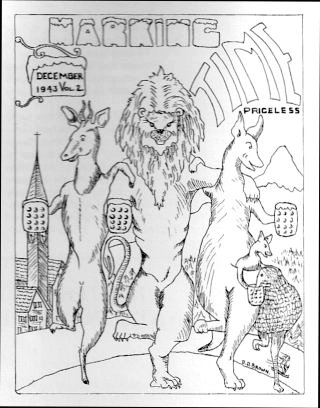
The content of Marking Time comprised articles and cartoons submitted by contributors amongst the escapers, who were stationed in detachments in various parts of the country. One of the covers of the magazine graphically depicts the 'marking time' theme, and is reproduced elsewhere in this text. It incorporates a lion, kangaroo, kiwi and springbok, representing the Commonwealth countries concerned, all marking time while clutching a glass of safl must in their paws, with a Swiss background. The cartoons, whoever, in particular reveal a cross-section of life as it was in Switzerland in those days.
One of the first subjects which received the attention of the cartoonists was the impact of hundreds of 'Pommies' thrust upon the unsuspecting inhabitants of remote Swiss villages, such as Degersheim, Butschwil, etc. This inundation by 'foreigners' was accompanied by some compensation in the form of their spending power - they received a stipend from the British government which, although meagre, amounted to a sizeable sum collectively. This served as a boon to villages deprived of tourist traffic since the outbreak of the war, and soon the local shops blazoned forth with signs 'English spoken here'. This proved to be a grave miscalculation; most of these 'Pommies', speaking as they did a variety of dialects originating anywhere between Land's End and John O'Groats, could hardly communicate with each other let alone with the bemused Swiss villagers. This produced the cartoon of the Cameron Highlander trying to make a purchase in a local shop.
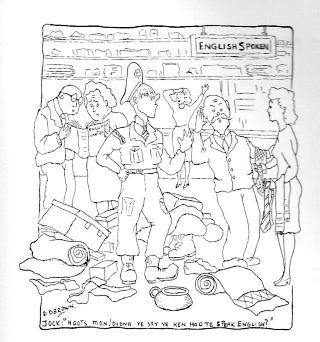
It was only a matter of time before the surrounding ski slopes received attention. The villagers found themselves at risk if they ventured out of doors, as the usually placid landscape became dotted with figures on skis weaving uncertain paths at uncontrollable speeds down the slopes. The air rang with their stentorian cries of achtung!. This situation resulted in the cartoon of the big-game hunter exhibiting his trophies in after years.
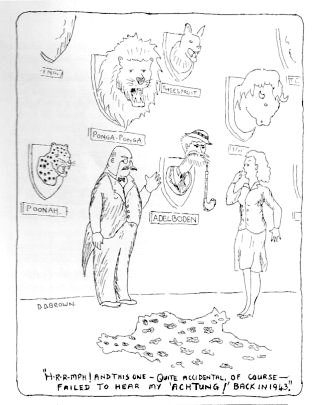
In due course the escapers were housed in hotels in various tourist localities such as Arosa and Adelboden. Up to this stage the relationship between officers and men had been relatively informal, having regard to the unique circumstances which held sway at the time. However, this move into a communal environment afforded the 'brass' an opportunity to re-introduce that form of apartheid so beloved of the Army, in which a rigid distinction is drawn between officers and other ranks regardless of character or intellect. Soon notices appeared at the entrances to certain lounges in the hotels: 'Officers only', or 'Other Ranks'. Cartoonists thrive on such fare, and the cartoon 'Game to the last' duly appeared. This had a sequel.
Shortly after the appearance of this cartoon, the perpetrator received a peremptory summons via a stern-faced sergeant-major, 'The colonel wants to see you!'. He made his way to the office where he was confronted by the senior British officer. Visions of courts martial and firing squads arose. The colonel, a character of steel who had faced Rommel's panzers with nothing more potent than a walking stick in his hand, looked up and asked mildly, 'Please may I keep your cartoon?'
This subject of military apartheid gave rise to a further cartoon based on the style of a famous Punch cartoonist of bygone years, by name Bateman, who specialised in exaggeration in order to accentuate his theme. The cartoon typifies the accidental entrance of a luckless 'other rank' into an 'Officers only' preserve in the Grand Hotel, Adelboden.
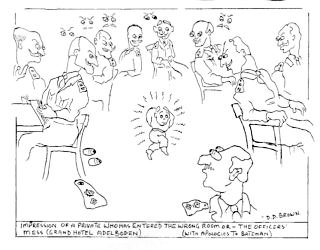
In peace-time, Switzerland is required to import the bulk of its requirements; it follows that with the country's encirclement in war-time a very stringent rationing policy had to be adopted for virtually every commodity. Life could be said to have revolved around the ubiquitous ration coupons. This was obvious material for a cartoonist, and Bateman's style lent itself admirably to the purpose. Thus we have the cartoon of the escaper who had never heard of coupons.
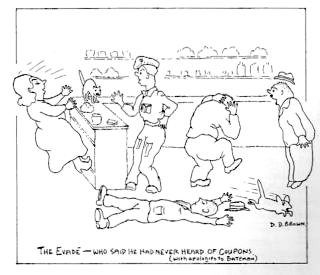
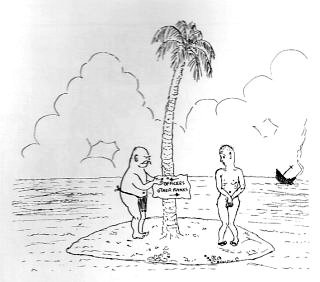
In this manner Marking Time served to divert and entertain the troops until the 7th American Army arrived at the Swiss border, having fought their way up from the south of France via Grenoble, Avignon and Aries.
Marking Time died a sudden death then as the escapers left Switzerland on Monday 25 September 1944 in order to wend their way homewards to the four corners of the earth from whence they had come.
The memory, however, lingers on.
Return to Journal Index OR Society's Home page
South African Military History Society / scribe@samilitaryhistory.org